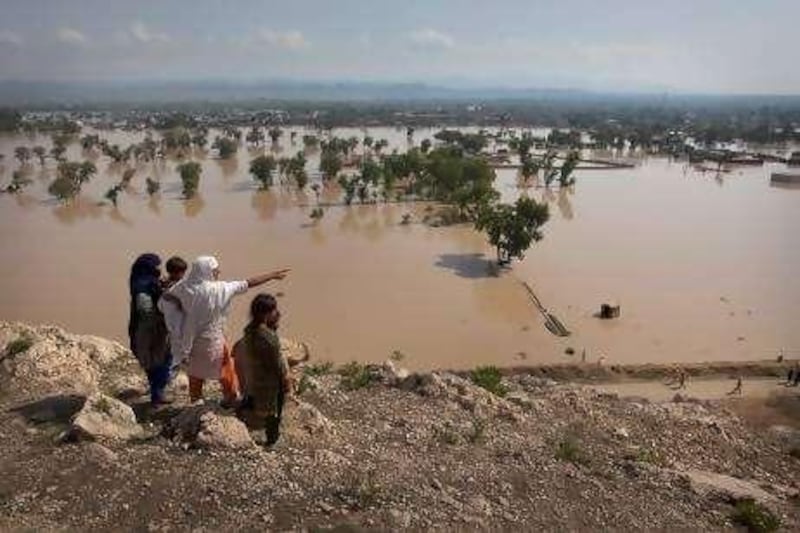ISLAMABAD // As the death toll climbed above 800 yesterday, survivors affected by the worst flooding Pakistan has seen since 1929 lashed out at the lack of response from the government, accusing it of ignoring their plight.
"We have seen people drowning at close distance. But no one could help anyone. Everyone feared for his own life," a resident of Nowshera in Khyber Pakhtoonkwa province angrily told local television. Sher Jan, a resident of Akora Khattak, said around 300 people are stranded in his village. "Everything has been destroyed. The government should provide us with food and shelter. We do not have any food left."
The provincial information minister, Mian Iftikhar Hussain, while speaking yesterday to local media in Peshawar, one of the hardest his areas, along with Lower Dir, Upper Dir, Nowshera, Hangu, Kohat, Manshera and Battagram, defended the rescue effort, saying 3,789 people had been rescued by relief workers and army officials. Government estimates put the number of people still trapped by the floods at 26,758.
"Government had taken pre-emptive measures and intimated people of affected area to shift to safer places, but the emergency call was not ... properly heeded by people," Mr Hussain said, adding that the floods have badly affected the communication network of the province. Rehman Malik, Pakistan's interior minister, visited hard-hit Naran in Khyber Pakhtoonkhwa yesterday and acknowledged that food and medicine were in short supplies. "I have asked officials to arrange a helicopter that would bring medicines to Naran tomorrow," he said.
Prime Minister Syed Yousuf Raza Gilani, after touring the devastated areas, also promised more help while television networks broadcast images of people clinging to poles and ropes to escape drowning as strong currents of water gushed by. Garhi Waris Khan, a small village in Charsadda district, was destroyed due to the floods, residents there said. "For the past three days, we are lying on the roadside. We have no clothes, no food." one resident told a local news network.
In Nowshera, vast swaths of land were marooned under water and bridges washed away. Alam Zeb, a police constable, said he had gone to help the stranded people along with a contingent of 17 police officers. "We are ourselves stranded in... AbbaKhel for the past three days. I have tried to contact the police high-ups but no help has arrived," he said. "Mobile signals in this area are very weak. I managed to talk to one colleague in Nowshera city. He said an army helicopter would rescue us but we are still waiting. We saw a helicopter flying nearby earlier today but it turned before it could approach us. We waved and made a lot of noise but no one heard our voices."
Farjad Abbasi, an assistant manager at Kunhar View Hotel in Naran, a picturesque valley and a popular tourist attraction in Mansehra district of the Khyber Pakhtoonkhawa province, said the city is now empty of tourists as roads there were cleared yesterday. July 29 was the worst day of the rains when Kunhar River overflowed and washed away three hotels along its banks, he said. "Roads were submerged in three feet water. Life came to a total standstill. It rained for 68 consecutive hours," Mr Abbasi said.
He said thousands of tourists had thronged the valley in recent weeks. "Our hotel has 10 rooms and about 60 people, including families and a... university trip was staying with us. We provided free accommodation to tourists and gave 50 percent off on food". "Everyone lived in a state of fear and uncertainty. There has been no electricity for the past three days. We had been running generators and fuel but since day before yesterday there is a shortage of fuel.
He said most of the tourists were forced to spend the nights on hilltops overlooking the city. "There was no shelter and people were forced to spend the night under the open sky," he said. "Right now it is cloudy here. One cannot say if it will rain or not. I am hoping it doesn't," Mr Abbasi said. foreign.desk@thenational.ae






